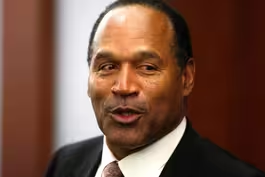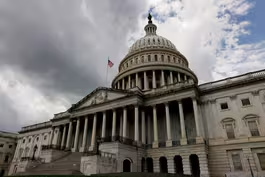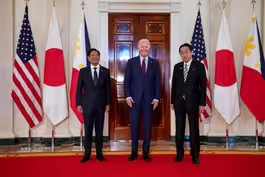
Biden to close 'gun show loophole,' expand background checks
Clip: 4/11/2024 | 7m 5sVideo has Closed Captions
Biden moves to close 'gun show loophole' and expand background checks for gun buyers
The Biden administration is issuing a rule designed to close a gap that allows gun buyers to avoid background checks. The move will end the so-called "gun show loophole” and require checks when dealers sell guns at gun shows, flea markets, social media or other places outside of brick-and-mortar stores. Geoff Bennett discussed more with Kris Brown.
Problems playing video? | Closed Captioning Feedback
Problems playing video? | Closed Captioning Feedback
Major corporate funding for the PBS News Hour is provided by BDO, BNSF, Consumer Cellular, American Cruise Lines, and Raymond James. Funding for the PBS NewsHour Weekend is provided by...

Biden to close 'gun show loophole,' expand background checks
Clip: 4/11/2024 | 7m 5sVideo has Closed Captions
The Biden administration is issuing a rule designed to close a gap that allows gun buyers to avoid background checks. The move will end the so-called "gun show loophole” and require checks when dealers sell guns at gun shows, flea markets, social media or other places outside of brick-and-mortar stores. Geoff Bennett discussed more with Kris Brown.
Problems playing video? | Closed Captioning Feedback
How to Watch PBS News Hour
PBS News Hour is available to stream on pbs.org and the free PBS App, available on iPhone, Apple TV, Android TV, Android smartphones, Amazon Fire TV, Amazon Fire Tablet, Roku, Samsung Smart TV, and Vizio.
Providing Support for PBS.org
Learn Moreabout PBS online sponsorshipGEOFF BENNETT: Welcome to the "NewsHour."
The Biden White House is issuing a rule designed to close a gap that allows gun buyers to avoid background checks.
Officials are touting the move to end the so-called gun show loophole, one of the most significant steps to crack down on unlicensed dealers in decades.
The rule requires background checks on buyers when dealers sell guns at gun shows, flea markets, social media or other places outside of brick-and-mortar stores.
Attorney General Merrick Garland today praised the effort.
MERRICK GARLAND, U.S. Attorney General: Under this regulation, it will not matter if guns are sold on the Internet, at a gun show or at a brick-and-mortar store.
If you sell guns predominantly to earn a profit, you must be licensed and you must conduct background checks.
This regulation is a historic step in the Justice Department's fight against gun violence.
It will save lives.
GEOFF BENNETT: We're joined now by Kris Brown, president of Brady, the nation's oldest gun violence prevention group.
Thanks so much for coming in.
We appreciate it.
KRIS BROWN, President, Brady Campaign to Prevent Gun Violence: Thanks for having me.
GEOFF BENNETT: So, gun show sellers and online vendors have been subject to much looser federal regulation than vendors who sell from brick-and-mortar stores.
How did we arrive at this two-tier system and what's been the effect of it?
KRIS BROWN: The effect is individuals who are dying in this country at the hands of killers who have far too easy access to firearms.
How did it happen?
Because, when the Brady law was enacted in 1993, there wasn't this thing we call the Internet and gun shows weren't big business.
Fast-forward to today, all of these years later, and they are, right?
The way that the Brady law was worded was really focused on brick-and-mortar dealers of firearms.
As a result of the proliferation of gun shows and Internet sales, estimates show about one in five guns sold today are sold with no background check at all.
This new rule, which was issued pursuant to the bipartisan Safer Communities Act -- so Congress told ATF to issue this rule.
They didn't do it just sua sponte, of nothing, OK?
And 15 Republican senators voted yes on that bill, says that anyone who is actually in the business of selling firearms anywhere, whether it's at a gun show, whether it's over the Internet, has to be a licensed seller.
And this will significantly increase the safety and the efficacy of the Brady background check system.
GEOFF BENNETT: So this rule will be in effect in 30 days.
KRIS BROWN: Correct.
GEOFF BENNETT: And the White House says that more than 20,000 individuals involved in unlicensed dealings could be affected by these changes.
In real terms, what's the impact of that, 20,000 individuals?
KRIS BROWN: Well, actually, what they're talking about is 20,000 sellers.
So let's keep in mind that many of these sellers who are selling today at gun shows or on the Internet may not be selling one or two or three or four.
They may be selling many firearms.
In fact, what the White House noted in its talking points is, these unlicensed sales studies show, and ATF has data recently, a huge proportion of the trafficked firearms that we find committed in crimes come from these unlicensed sellers.
So the lifesaving potential is huge.
Again, hearkening back, one in five guns sold today, 20 percent of firearms, and millions are sold, right, are now potentially subject to this rule.
What's left undone is a universal background check.
We still advocate that.
And what would that mean?
That means, any time you ever do a transfer of a firearm, a background check happens.
This rule focuses on the commercial sale.
We want to ensure that it's a universal check.
GEOFF BENNETT: Well, gun rights advocates say that this rule and expanded background checks will put onerous restrictions on law-abiding citizens and won't actually stop criminals from getting guns.
Here's what Erich Pratt -- he's the senior vice president of Gun Owners of America.
Here's what he told us earlier today.
ERICH PRATT, Senior Vice President, Gun Owners of America: This is a restriction the Second Amendment.
It's not going to make people safer.
This rule will not stop bad guys from getting weapons, for starters.
You don't punish good people or restrict their rights because of what bad guys do.
GEOFF BENNETT: So, what about that, that the overwhelming number of criminals rely on illegal purchases, either from the black market or from straw purchases?
KRIS BROWN: Well, first of all, 15 members of the United States Senate who are Republicans, including John Cornyn from Texas, said that this exact law that was passed that ATF has now adopted here in this regulation struck the right balance and isn't infringing on people's Second Amendment rights.
So I would push back that anyone's Second Amendment rights are actually infringed upon here.
And looking at the rule and the details behind it, we have traffickers and sales that are illegal happening today.
And the harm that's being meted out is on victims of gun violence who are being killed because we allow people who are felons or domestic abusers to easily access guns through this loophole.
Today, that is being closed, and we think the balancing to save lives is the right kind of balance to make.
GEOFF BENNETT: As you mentioned, the Biden administration found a provision in existing law to get this rule done.
They're basically doing a work-around around Congress because of congressional Republicans, for the most part, and a couple of Democrats who have blocked universal background checks.
Are there any other novel ways you think this administration could push forward gun safety policy?
KRIS BROWN: Look, I think this administration has gone about as far as you can go without congressional action.
I think there are additional things that the Office of Gun Violence Prevention, which President Biden created, under the auspice of Vice President Harris, is doing, a whole-of-government approach, for example, thinking through how we procure firearms in this country, and making sure that any federal or state agency that is procuring firearms is only purchasing them from dealers who don't have a single crime gun associated with their business.
There are many things like that that this administration is looking at, and it can do.
But if we, as Americans, want to ensure that every single gun sale is subject to a background check, we're going to have to think about this in this next election and make sure we make that a priority, because only that authority can be provided by Congress.
GEOFF BENNETT: Kris Brown of Brady, thanks so much for your time and for your insights.
We appreciate it.
KRIS BROWN: Thank you.
Thanks for having me.
'Chili crunch' trademark sparks debate over food and culture
Video has Closed Captions
Clip: 4/11/2024 | 7m 15s | Celebrity chef's 'chili crunch' trademark sparks debate over food and culture (7m 15s)
How Simpson's murder trial exposed a stark racial fissure
Video has Closed Captions
Clip: 4/11/2024 | 9m 22s | How O.J. Simpson's murder trial exposed a stark racial fissure in America (9m 22s)
Right-wing Republicans block reauthorization of FISA
Video has Closed Captions
Clip: 4/11/2024 | 6m 35s | Why right-wing Republicans are blocking the reauthorization of FISA (6m 35s)
U.S. bolsters Asian military ties amid Chinese provocations
Video has Closed Captions
Clip: 4/11/2024 | 8m 59s | U.S. bolsters military ties with Japan and Philippines amid Chinese provocations (8m 59s)
Wind-assisted vessels could make shipping climate-friendly
Video has Closed Captions
Clip: 4/11/2024 | 7m 20s | Wind-assisted vessels could make commercial shipping climate-friendly (7m 20s)
Providing Support for PBS.org
Learn Moreabout PBS online sponsorship
- News and Public Affairs

FRONTLINE is investigative journalism that questions, explains and changes our world.

- News and Public Affairs

Amanpour and Company features conversations with leaders and decision makers.












Support for PBS provided by:
Major corporate funding for the PBS News Hour is provided by BDO, BNSF, Consumer Cellular, American Cruise Lines, and Raymond James. Funding for the PBS NewsHour Weekend is provided by...




